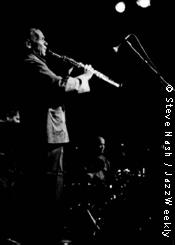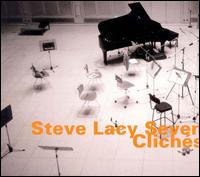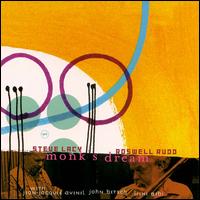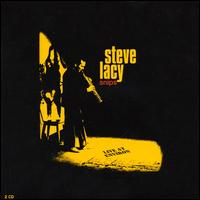


A
FIRESIDE CHAT WITH STEVE LACY
I can't say enough about Steve Lacy. Never mind that his voice on the
soprano saxophone is so distinctive that you can name that tune in five
notes. He is a provocative composer as well. And bar none, no one interprets
Thelonious Monk better than Lacy. He has done numerous records proving
my point. Verve (unbelievably bold and I applaud them) has just released
Monk's Dream, featuring frequent Lacy collaborator, trombonist Roswell
Rudd. They are coming to a club near you, Boston, the Regattabar, Chicago,
the Empty Bottle, and my own City of Angels, McCabes, so break open the
bank. This is a once in lifetime kind of thing here. This has to be the
finest interview that I have read in at least a week (JW is a weekly),
so take a gander, unedited and in his own words.
FRED JUNG: Let's start from the beginning.
STEVE LACY: I was born in New York in 1934. I fell in love with jazz when
I was twelve years old from listening to Duke Ellington on record and
hearing a lot of jazz in New York on the radio. I was playing piano poorly
from the age of eight until I heard Art Tatum at the age of thirteen and
gave up the piano. At the age of sixteen, I took up the soprano saxophone
after having fooled around with the clarinet for a while. I heard Sidney
Bechet play a Duke Ellington piece and fell in love with the soprano saxophone.
I worked days to get some money and bought a soprano saxophone without
knowing anything about it. Then I was hanging around Dixieland concerts
and listening to New Orleans masters and the Chicago people and the Kansas
City people and the weekend jazz concerts in Central Plaza in New York,
a beer hall that had Friday and Saturday concerts with two bands each.
That's where I found my first teacher, Cecil Scott, who was a saxophone
and clarinet player and bandleader from the Midwest and who was a very
good teacher, took me under his wing and after a couple of years with
him, I started to sit in with these people. Then soon after, they started
to hire me as an add-on to their bands. Like they had trumpet, trombone,
clarinet, piano and drums and they added me on at the soprano saxophone
as an extra player. That was in the early Fifties. Then I started working
with all these traditional players like Red Allen, Pee Wee Russell, quite
a few people from the different schools of traditional jazz and that is
how I got my start.
FJ: At the time, the soprano saxophone was foreign to most bandleaders.
STEVE LACY: It didn't exist, Fred. It was in complete limbo. Nobody was
playing it. They were in pawnshops and in the back of musical instrument
stores. Sidney Bechet was in Europe by that time and his only student
Bob Wilber was playing pretty much like him. But that was all, nobody
was playing the soprano saxophone and certainly nobody was trying to do
anything with it. So I was all alone. I didn't know that at first, but
I soon found out.
FJ: Finding work must have been an uphill battle, just on basis of that.
STEVE LACY: It was very difficult at first, but on the other hand, Fred,
the advantage was that I didn't compete with anybody. I didn't take anyone
else's job away from them. I was welcomed on as an additional player.
On the other hand, I couldn't get work because when I gave up the clarinet
and just concentrated on soprano saxophone, then I really put myself out
there. It was difficult to get work, but I had my own little bands all
the time. From the age of sixteen, I had my own amateur band and a little
bit later, different groups, trios, quintets, and things like that, plus
working with the traditional players until I ran into Cecil Taylor and
Cecil Taylor put me out in the ocean, in the avant-garde ocean really.
I worked with him for six years.
FJ: Cecil's individuality made a great many enemies.
STEVE LACY: Well, the thing is, Fred, we both loved Duke Ellington and
so to me, it wasn't so far out. I understood his music perfectly. Everybody
was against him, just about. There were only about three or four people
that really liked what he was doing, the few of us in his band, Dennis
Charles and myself, Buell Neidlinger on bass. We appreciated what he was
doing and he had three or four people that would follow us around that
really liked what he was doing, but almost everybody else was against
it. There was a sea of hostility around him from club owners who would
lock the piano when he would walk in and drummer who would run from the
bandstand when he would arrive. Critics and almost all the musicians were
hostile to what he was doing. Now, when you listen to those early records
of his, it doesn't seem so weird at all. It seems very swinging and humorous
and coherent, but at that time, it seemed like a threat to many musicians.
It was a threat to jazz. It was a threat to piano players. Critics and
clubs and really everybody was against him, except us.
FJ: What were they afraid of?
STEVE LACY: He was way ahead of everybody. He was a very advanced player.
He was very original. He had a lot of technique and it was very daring
and challenging, what he was doing. Anybody that comes along with some
new message, it threatens the people that are carrying the old message.
The more original something is, the more of a threat it seems until the
people catch up with it. That happened with Thelonious Monk. It happened
with anybody who is really original. Whoever has an original thing to
say, it is sort of a threat to the status quo.
FJ: You have a special affinity for the music of Thelonious Monk, recording
a handful of albums devoted to Monk's music.
STEVE LACY: Well, when I was playing with Cecil, one of the tunes we played
was "Bemsha Swing," of Thelonious Monk. Cecil really turned me on to Monk's
music. When I heard Monk in person in 1955, it was in a club. He was playing
with a quartet in a small club. The place was full of musicians, but there
was no public at all. It was really esoteric, avant-garde, for musicians
only. A few years later, after Miles had recorded "Round Midnight," which
was a big hit, people started getting interested in Monk's music. I was
already crazy for it and trying to learn all his music. In 1959, I made
a record of all Monk music and that was the first album that anybody had
ever done of exclusively of his music. That is how I got in deeper contact
with him. And then a year or so later, he hired me for both his big band
and his quintets. I worked with him for sixteen weeks in a club and festivals
and the Apollo Theater and different places with him, all for a whole
season like that. It was great.
FJ: I have to commend Verve for having the courage to put out a recording
with you and Roswell Rudd, Monk's Dream.
STEVE LACY: I knew the producer for a long, long time and he wanted to
do something with me for a long time, but he couldn't justify it to his
boss until this happened and Roswell and I started to play together again.
We were doing something in Paris and I approached him and said, "Look,
here is an opportunity. Maybe we can do something." He cleared that and
we went ahead on it. As you say, Fred, it is courageous, but risk is at
the heart of jazz. Every note we play is a risk. These people are very
sympathetic to the music, but they also have commercial considerations.
It is just like Monk, Fred. It started in the avant-garde, esoteric, musicians
only, and a few years later, he was a star and people came from all over
the world to see him. Now people play his music all over the world and
they are considered classics. It goes from the avant-garde to the classic
stage. It may take twenty or thirty or forty or fifty years, but eventually,
the public and even the producers catch up and something become viable,
even commercially, just by virtue of the fact that it has been cooking
for so many years. It is like wine. When it is new wine, it is only for
the experts, but when it gets older, everybody wants it.
FJ: New wine, old bottles they say.
STEVE LACY: Well, this is old wine, new bottles (laughing).
FJ: Are people catching up to your music now?
STEVE LACY: Not completely, but enough. Enough so I can live from it.
We can record for a major label and we're doing twenty-two concerts now
from coast to coast and Canada too. I have a good agent and record company,
yeah, Fred, I would say that there is some kind of catch up going on there.
FJ: It has been a long time coming.
STEVE LACY: Yeah, these things take a long time. Cecil Taylor too, he
was in the hall of shame, right? I worked with him six years and twenty
years later, he was in the hall of fame. So it is a natural process. We
have seen it happen so many times, but people don't seem to get the point.
They don't seem to understand that it is a natural process. It is an organic
thing. When something is interesting, it becomes more interesting.
FJ: Playing the straight horn, it must have killed you to witness the
dawn of Kenny G.
STEVE LACY: (Laughing) He is my illegitimate nephew.
FJ: Don't tell anyone. We will just keep that between the two of us.
STEVE LACY: (Laughing) Well, it is just proof that the instrument is a
good instrument. It can be played in so many different ways. You could
do this with it. You could do that with it and you can make a lot of money
with it if you play it that way. So it is a very flexible instrument.
There is so much potential in it, which was not apparent when I first
started, but it is now. And Kenny G is a proof of it. I have to be grateful
to him for proving that the instrument can be played all different kinds
of ways.
FJ: Has that potential been reached on Monk's Dream?
STEVE LACY: I was very happy with the way it came out and certainly, the
way it is being promoted now. What I hear on it is the fact that Roswell
and I both came out of traditional jazz. We have that collective improvisational
thing going and not everybody can do that. The young players now, they
can't do that. But we can do that, so we do it. We do what we can. It
has a flavor to it that goes way, way back to the origins of jazz. It
makes me very happy and there is a certain joy there. On the other hand,
the rhythm section, those people have been playing with me for years.
Jean-Jacques Avenel has been playing with me for twenty-five years and
John Betsch has been playing with me for twelve years now. And Irene,
my wife sings two of those songs on there. That is a thirty-year association.
So those things are organic, Fred. That is something that is grown over
a long period of time. That is why it has a certain positive flavor to
it. I am happy that it exists on record, really.
FJ: Your trio and even Roswell, you have such a lengthy association with
him.
STEVE LACY: Long time.
FJ: That is non-existent in today's market.
STEVE LACY: I think so too. There is a lot of jerrybuilt structures out
there and put together things, and sudden all-stars, and shotgun marriages
and all kinds of things. You can't imitate something that is homegrown
over a long period of time.
FJ: To liberally cite a sports analogy, when you have a quarterback and
receiver tandem that have worked with one another over a period of time,
there is an undeniable chemistry.
STEVE LACY: Exactly. You can take risks that other people can't. You can
have more fun than other people and you can win more games.
FJ: Are musicians taking those risks?
STEVE LACY: Not too many, Fred. There is an awful lot of what I call recreational
jazz going on, where people go out and learn a particular language or
a particular style and practice it and become real sharks on somebody
else's language really. When I came up, it was all about originality and
collective research. There is an awful lot of imitation going on now,
recreation jazz, almost like gymnastics.
FJ: Frank Sinatra referred to that as "aping." And back then, musicians
avoided that, maybe it is the whole karaoke phenomenon, but it almost
seems accepted these days.
STEVE LACY: Yeah, the people that really inspired me, each one had their
own voice, their own style, their own manner, their own language, but
it fit together and they could have wonderful times and play together.
But each one had their own voice and their own style. That is what inspires
me and it still does. I still love the whole history of jazz, Fred. The
old things sound better than ever. If you listen to Louis Armstrong from
1929, you will never hear anything better than that really and you will
never hear anything more free than that, Charlie Parker and all those
things, they all had an individuality and collectivity and a lot of freedom.
FJ: And the future?
STEVE LACY: I think it is a very exciting period for us right now. The
fact that I have a label and a good manager and it is opening up more
and more for me in America. I still live in Paris after thirty years,
but I come more and more frequently to America. I am coming again in a
couple of months with Mal Waldron, who I have been working with since
the Fifties. We are doing Lincoln Center and a week at the Iridium. There
is more and more potential for me in America and that is wonderful.
FJ: I am pleased to see we are catching up.
STEVE LACY: Yes, thank you, Fred.
Fred Jung is Editor-In-Chief and a hard day calls for a hard lemonade.
Comments? Email
him.

